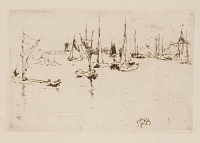Etchings Institutions search term: grolier club
Barges, Dordrecht | ||
| Number: | 262 | |
| Date: | 1886 | |
| Medium: | etching | |
| Size: | 66 x 99 mm | |
| Signed: | butterfly at lower right | |
| Inscribed: | no | |
| Set/Publication: | no | |
| No. of States: | 1 | |
| Known impressions: | 10 | |
| Catalogues: | K.244; M.241 | |
| Impressions taken from this plate (10) | ||
TECHNIQUE
It was done in pure etching, with no drypoint.
PRINTING
Although Whistler did apparently print and sell one impression of this etching it has not been located. None of the known impressions are signed and it seems likely that they were not printed by Whistler.
One impression printed in brown ink on cream 'modern' (post-1800) laid paper from a book is a good clear print, but shows that the plate was somewhat scratched ( ); this was bought by Charles Lang Freer (1856-1919) in 1904, so it could have been printed in Whistler's lifetime or immediately after his death. According to the Freer Gallery of Art records, this impression originally bore a note by Freer reading 'Erased April 25th, 1924.' Freer may not have been accurately informed: the plate may have been damaged rather than cancelled.
); this was bought by Charles Lang Freer (1856-1919) in 1904, so it could have been printed in Whistler's lifetime or immediately after his death. According to the Freer Gallery of Art records, this impression originally bore a note by Freer reading 'Erased April 25th, 1924.' Freer may not have been accurately informed: the plate may have been damaged rather than cancelled.
 ); this was bought by Charles Lang Freer (1856-1919) in 1904, so it could have been printed in Whistler's lifetime or immediately after his death. According to the Freer Gallery of Art records, this impression originally bore a note by Freer reading 'Erased April 25th, 1924.' Freer may not have been accurately informed: the plate may have been damaged rather than cancelled.
); this was bought by Charles Lang Freer (1856-1919) in 1904, so it could have been printed in Whistler's lifetime or immediately after his death. According to the Freer Gallery of Art records, this impression originally bore a note by Freer reading 'Erased April 25th, 1924.' Freer may not have been accurately informed: the plate may have been damaged rather than cancelled.Some impressions from the plate, and from the plate after it was damaged, were certainly printed after Whistler's death. One, in black ink on cream laid paper, was printed slightly askew on the sheet ( ); this is very similar indeed to impressions of Little Dordrecht (
); this is very similar indeed to impressions of Little Dordrecht ( ) and The Little Wheelwright's (
) and The Little Wheelwright's ( ) in the same collection (the Library of Congress) and suggests all these came into the hands of someone who printed them without due care. This may be why the plate was damaged.
) in the same collection (the Library of Congress) and suggests all these came into the hands of someone who printed them without due care. This may be why the plate was damaged.
 ); this is very similar indeed to impressions of Little Dordrecht (
); this is very similar indeed to impressions of Little Dordrecht ( ) and The Little Wheelwright's (
) and The Little Wheelwright's ( ) in the same collection (the Library of Congress) and suggests all these came into the hands of someone who printed them without due care. This may be why the plate was damaged.
) in the same collection (the Library of Congress) and suggests all these came into the hands of someone who printed them without due care. This may be why the plate was damaged.The perpetrator was almost certainly Mortimer Luddington Menpes (1860-1938). In a draft catalogue of Whistler's etchings, Joseph Pennell (1860-1926) wrote that Menpes owned the copper plate. 7 However, the plate may have been damaged after it left his hands.
Impressions from the damaged plate were offered for sale in Great Britain in 1961, 1991 and 2004, and all were undoubtedly printed posthumously ( ,
,  , and
, and  ). They were printed in black ink on a heavy-weight, coarse wove paper, with a wide margin.
). They were printed in black ink on a heavy-weight, coarse wove paper, with a wide margin.
Impressions from the damaged plate were offered for sale in Great Britain in 1961, 1991 and 2004, and all were undoubtedly printed posthumously (
 ,
,  , and
, and  ). They were printed in black ink on a heavy-weight, coarse wove paper, with a wide margin.
). They were printed in black ink on a heavy-weight, coarse wove paper, with a wide margin.7: J. Pennell, n.d., draft catalogue (cat. no. 246), Library of Congress, Pennell Collection, Box. 353.
